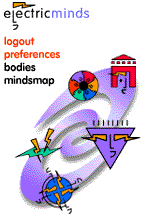| |

Collaborative Filtering
Howard Rheingold
Matching People and Information
on the Internet
The great advantage of the Web is that it is full of information,
and that is also its great disadvantage: how do you find the information
you want and connect with people who share your interests in such a vast,
ever-changing, haphazardly-organized collection of people and information?
Collaborative filtering, a technique for matching people with information
and with other people, is a web-based tool that grew out of research at MIT Media Lab.
One of the earliest experiments that led to today's collaborative
filtering technology was a service at MIT called "Ringo." You listed your favorite musical groups, and computer analysis of a large population of
lists gave you a message like: "Ninety percent of the people who liked the
music you listed also liked the following musicians." Extend that method to
books and to more general interests, and you have the basis of a service
that can enable large populations of websurfers to share information, to
connect with each other, and to make recommendations to likeminded people.
A comprehensive list of links to information about collaborative
filtering can be found at UC Berkeley's Collaborative Filtering Conference page.
Besides the need to sort through information, another force has
driven the development of this technology: the search for ways to make
money on the Internet. The need for a viable revenue model has driven
companies to try every way possible to glean information about the people
who visit their websites. Demographic information is what enables
publishers to charge advertisers to display messages to users; if you know
your users are the kind of people who buy cars or diapers, you are more
likely to sell advertising to Nissan or Proctor and Gamble. The ad banner
model has met with some success, but there are no good mechanisms for
advertisers to target who sees their ads. Some sites, like online
newspapers, use surveys in order to tailor their information so that people
get what they are likely to want or find useful, based on their
socioeconomic or demographic status. Bruce Krulwich of Andersen Consulting
writes, "Can you imagine if Web sites could learn about you without having
to bother you with these surveys?"
Andersen Consulting's LifeStyle Finder is touted as "a way to suggest on-line
information to people based on their overall lifestyles, not on their
particular interests." Instead of asking specific questions about your
income range, age, sex, marital status, etc., it attempts to figure out who
you are by asking broad lifestyle questions: do you prefer sporting events,
the theatre, or shopping? It's designed to be unintrusive (make it seem
like they aren't gathering data) but it ends up fitting people into extremely broad categories.
Firefly, which grew out of the Ringo project, allows you to rate music and movies. Based on what you have said you like and don't like, it recommends other artists and movies to you. They are now branching out to take advantage of the collaborative filtering technology. They offer Java-based chat, and are in the process of beta-testing a new system called "The Firefly Network," which is intended to bring together many different types of sites that use their collaborative filtering technology.
Affinicast asks you 15 questions (it
calls them "attitude items") to try to figure out who you are. They ask you to rate yourself on scales such as "your primary purpose online: recreation vs. productivity" and "preferred media style: opinionated vs. imnpartial." They claim that their predictive performance is significantly better than that accomplished by traditional demographics. Identifying yourself as interested in "opinionated, dark, forbidden, cutting edge" media gets you links to Crashsite and Big Time Television, among others.
This technology raises important privacy questions. How do information-gathering sites use that information in regard to your personal identity? Do they act as trusted intermediaries, delivering advertising messages tailored to your needs? Or do they sell your name to direct marketing companies? Like all tools, collaborative filtering has advantages and disadvantages, and like all tools, it has a shadow side.
Join the discussion about collaborative filtering in the Tomorrow conference.
| |
librarybob said:
I think it would be useful to distinguish
between "innate ability" and "the result after many
years of acculturation and schooling" to define "dumb".
I wouldn't think it likely that there has been an
innate (genetic) change, so that if people have indeed
been dumbed down, it must be due to environmental
causes.
Actually, maybe "dumbed down" isn't quite right--maybe
very committed to "low" and "mid" culture that really
doesn't demand much thinking. A problem I see is that
both of these are "ahistoric," living in the here and
now with little sense of a past and little sense of a
future. They lack a larger context.
Join the conversation!
Most Active Topics:
Topic 45 The Future of Families
Topic 42 Library of Tomorrow: 20 Questions (game)
Topic 4 Suggestions for future Tomorrow columns
All Howard Rheingold's Tomorrow Topics
| |



